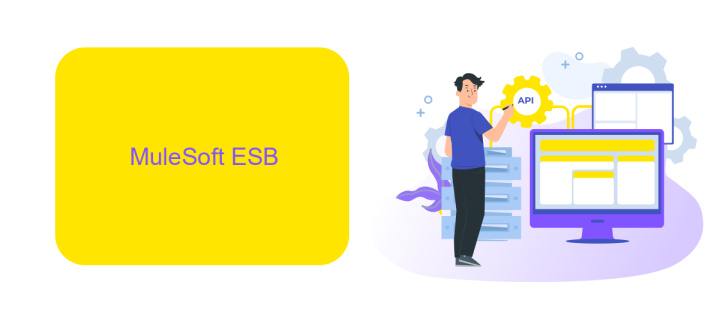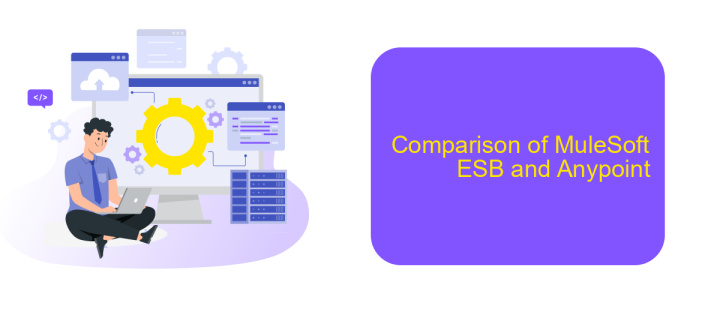MuleSoft ESB Vs Anypoint
MuleSoft offers powerful tools for integrating applications, data, and devices, with its two primary solutions being Mule ESB (Enterprise Service Bus) and Anypoint Platform. This article explores the key differences and advantages of Mule ESB and Anypoint, helping businesses decide which solution best fits their integration needs. Whether you're looking for robust ESB capabilities or a comprehensive integration platform, MuleSoft has you covered.
Introduction
In the rapidly evolving landscape of enterprise software, businesses are increasingly relying on integration platforms to streamline their operations. MuleSoft ESB and Anypoint Platform are two prominent solutions in this domain, each offering unique features and capabilities. Understanding the differences between these platforms is crucial for organizations aiming to optimize their integration strategies.
- MuleSoft ESB: A robust enterprise service bus that facilitates seamless communication between different applications and services.
- Anypoint Platform: A comprehensive integration platform that includes API management, design, and analytics tools.
- ApiX-Drive: An intuitive service that simplifies the setup of integrations, making it easier for businesses to connect various applications without extensive coding.
Both MuleSoft ESB and Anypoint Platform offer significant advantages for enterprises looking to enhance their integration capabilities. While MuleSoft ESB focuses on providing a strong backbone for communication between systems, Anypoint Platform offers a broader range of tools for managing APIs and integrations. Additionally, services like ApiX-Drive can complement these platforms by offering user-friendly solutions for quick and efficient integration setups.
MuleSoft ESB

MuleSoft ESB (Enterprise Service Bus) is a robust and versatile integration platform that facilitates seamless communication between various applications, services, and systems. It enables organizations to connect disparate systems, whether they are on-premises or in the cloud, through a unified integration layer. MuleSoft ESB offers a range of tools and features that simplify the development and management of integration solutions, ensuring scalability and flexibility. It supports multiple protocols and data formats, making it an ideal choice for enterprises looking to streamline their integration processes.
One of the key advantages of MuleSoft ESB is its ability to provide real-time data integration and transformation. This capability is essential for businesses that need to quickly adapt to changing market conditions and customer demands. Additionally, MuleSoft ESB offers comprehensive monitoring and management tools, allowing organizations to maintain visibility and control over their integration flows. For those looking for a more automated approach to integration, services like ApiX-Drive can be leveraged to further simplify the process, enabling users to set up integrations without extensive coding or technical expertise. This combination of MuleSoft ESB's powerful features and ApiX-Drive's user-friendly interface ensures efficient and effective integration solutions for any business.
Anypoint Platform

Anypoint Platform is a comprehensive integration solution that enables businesses to connect applications, data, and devices seamlessly. It offers a unified platform for API management, design, and development, making it easier to build and maintain integrations across various systems. This platform is highly scalable and supports both on-premises and cloud deployments, providing flexibility for different business needs.
- API Management: Anypoint Platform provides robust tools for designing, managing, and securing APIs, ensuring smooth and secure data exchange.
- Integration Capabilities: The platform supports a wide range of integration patterns, including real-time, batch, and event-driven integrations.
- Monitoring and Analytics: It offers comprehensive monitoring and analytics tools to track the performance and health of integrations, allowing for proactive issue resolution.
- Pre-built Connectors: Anypoint Platform includes a vast library of pre-built connectors for popular applications and services, simplifying the integration process.
In addition to these features, the platform can be enhanced with tools like ApiX-Drive, which simplifies the process of integrating various applications and automating workflows. This makes Anypoint Platform a versatile and powerful solution for businesses looking to streamline their integration processes and improve operational efficiency.
Comparison of MuleSoft ESB and Anypoint

MuleSoft ESB and Anypoint Platform are both integral parts of MuleSoft's ecosystem, designed to facilitate seamless integration across various systems. While MuleSoft ESB focuses on providing a robust enterprise service bus for application integration, Anypoint Platform offers a comprehensive suite of tools for API management and integration.
MuleSoft ESB is ideal for organizations looking to integrate their existing applications and services efficiently. It provides a strong foundation for building and managing integrations with minimal coding. On the other hand, Anypoint Platform extends these capabilities by offering a unified platform for designing, deploying, and managing APIs and integrations.
- MuleSoft ESB: Best for traditional integration needs, strong ESB capabilities.
- Anypoint Platform: Comprehensive API management, cloud and on-premise deployment options.
- ApiX-Drive: Simplifies integration setup, user-friendly interface for non-developers.
In conclusion, while MuleSoft ESB is excellent for core integration tasks, Anypoint Platform provides a more extensive set of features for modern API management and integration needs. For businesses seeking an easy-to-use integration service, ApiX-Drive offers an intuitive solution that complements both MuleSoft ESB and Anypoint Platform.
Conclusion
In conclusion, both MuleSoft ESB and Anypoint offer robust solutions for integration needs, each with its unique strengths. MuleSoft ESB provides a solid foundation for enterprise service bus architecture, facilitating seamless communication between disparate systems. On the other hand, Anypoint Platform extends these capabilities further by offering a comprehensive suite of tools for API management, design, and analytics, making it a more versatile option for modern enterprises.
While choosing between MuleSoft ESB and Anypoint, organizations should consider their specific requirements and integration goals. For those looking to simplify the integration process even further, services like ApiX-Drive can be invaluable. ApiX-Drive enables easy and efficient integration setup without the need for extensive coding, thus complementing the capabilities of both MuleSoft ESB and Anypoint. Ultimately, the choice will depend on the organization's current infrastructure, future scalability needs, and the level of integration complexity they are prepared to manage.
FAQ
What is the main difference between MuleSoft ESB and Anypoint Platform?
Can I use MuleSoft ESB without the Anypoint Platform?
Is MuleSoft ESB suitable for cloud integration?
How does the Anypoint Platform enhance API management compared to MuleSoft ESB alone?
Are there alternative services for automation and integration setups?
Strive to take your business to the next level, achieve your goals faster and more efficiently? Apix-Drive is your reliable assistant for these tasks. An online service and application connector will help you automate key business processes and get rid of the routine. You and your employees will free up time for important core tasks. Try Apix-Drive features for free to see the effectiveness of the online connector for yourself.

